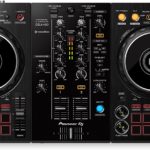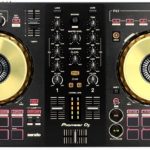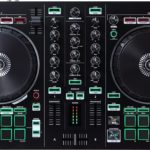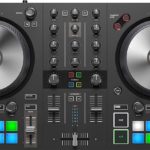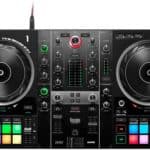Best DJ Controller for Beginners
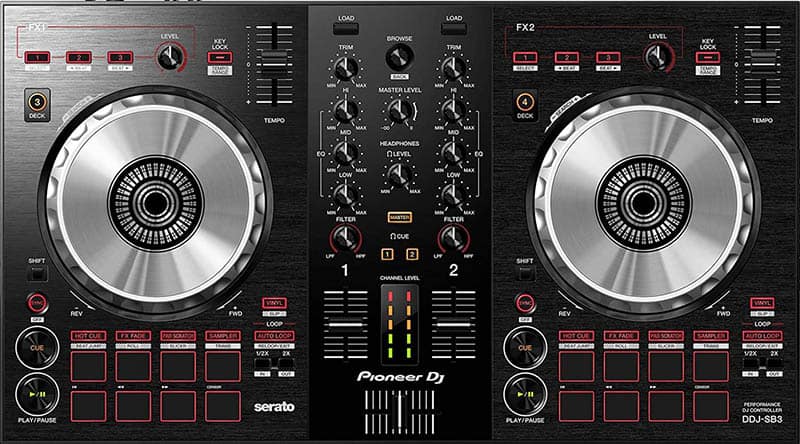
As far back as the early 90s, I spent every penny I earned as a staff writer on a games magazine and bought myself a pair of Technics 1210s and a Numark mixer and entered the world of DJing. Y’know with actual records, no sync button, and permo-back-ache from lugging crates of records about. Fast forward a couple of decades and the vast majority of that gear has been rehomed (which still makes me sad inside). When I took the plunge into digital DJing it was entirely for space reasons. Life had taken over and I no longer had space for 1000s of vinyl, nor the space for a proper DJ set up. That room had been earmarked for a forthcoming baby’s arrival.
Fortunately, technology was my friend and I could keep the old party rocking for a fraction of the space and cost.
Things these days are even better with the entry-level DJ controllers so much more than their niche. For a couple of hundred, you can get great equipment that will make your partiers the talk of everybody you know. Choosing the correct one can be a bit daunting, but with all our expertise, we can at least guide you in the right direction. Let’s get going.
Products at a Glance
Best DJ Controller for Beginners
- Pioneer's latest beginner control so packed with up to date features
- Standard club layout
- Excellent jog wheels
- More forgiving tempo adjustment for beat-matching
- Rekordbox, while gaining popularity is by no means the industry standard to learn on
- Some aspects of the controls fee a bit cramped together.
The DDJ-400 is Pioneer’s latest controller aimed at the beginner market and as such is the one controller here designed to be used with Rekordbox as its primary DJ software. Rekordbox is the new kid on the block compared to the likes of Serato and Traktor which have been around an eternity. This could be a sticking block for people who already know one of those two pieces of software inside out, but if you are starting out on your DJ journey you are likely not going to be bothered and Rekordbox is growing at maturing quickly and already linked up with several DJ streaming services such as Beatport Link.
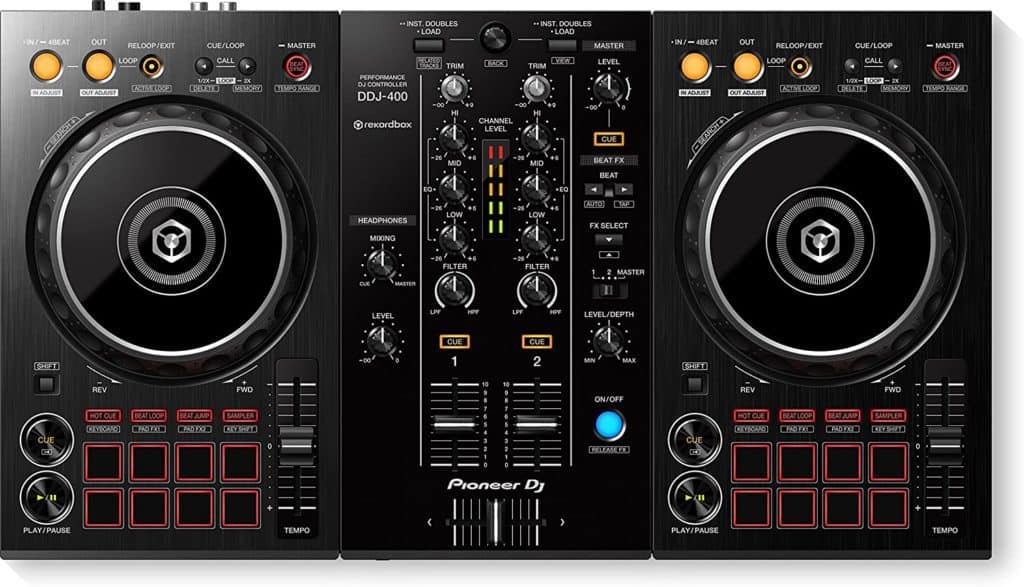
The controller itself is as good as anything Pioneer DJ has produced at this price point. There has been an active effort to replicate the look and feel of CDJs that you will find in your progress to gigs in clubs and bars, right down to the different materials used on the faceplate.
The vast majority of button positions are replicated and to all intents and purposes, the main difference is that it is just a smaller unit. This comes with a slightly better set of faders for tempo adjustment than most of the others on this page, again getting you closer to that real feel. Of course, if you learn the positions in and out and then head to your first club gig and they are set up with Serato you still might have a bit of a wobble. Having said that mappings exist online to set this up with Serato too if you are comfortable with that.
The DDJ-400 comes minus the performance scratch and fades of the SB3 below but the layout elevates it here as it is more club standard. By and large though, you could choose either and would be very happy with what you set up.
- Interesting auto scratch and fade presets
- Pioneer DJ layout for club practice
- Greta Low-Hi pass filter and trim knobs
- Powered by USB
- Small faders
- Filter sometimes stays on in Serato, need to be careful
- 3.5mm headphone jack only
- Limited outputs
I really like the SB3. It got a little unfair criticism on release by DJ snobs for its, let’s say unusual, addition of in-built scratch patterns designed by the world-famous DJ Jazzy Jeff. And while it’s true you probably aren’t going bust out fake scratches in routine, you also aren’t likely to be using this on tour in Ibiza so for a bit of fun and inspiration I’m not against it.
Build quality is pretty much spot-on as you would expect from Pioneer Dj, and while the unit is pretty much all plastic, it never feels cheap. The jog wheels are as good as I have used on a beginner controller giving great control over the finest of tweaks. The same can’t be said for the faders which are very short throw – the bane of the beginner DJ controller so if you want to match with minus the use of the Sync button, things are a bit fiddlier than they are on a full-size Pioneer mixer.
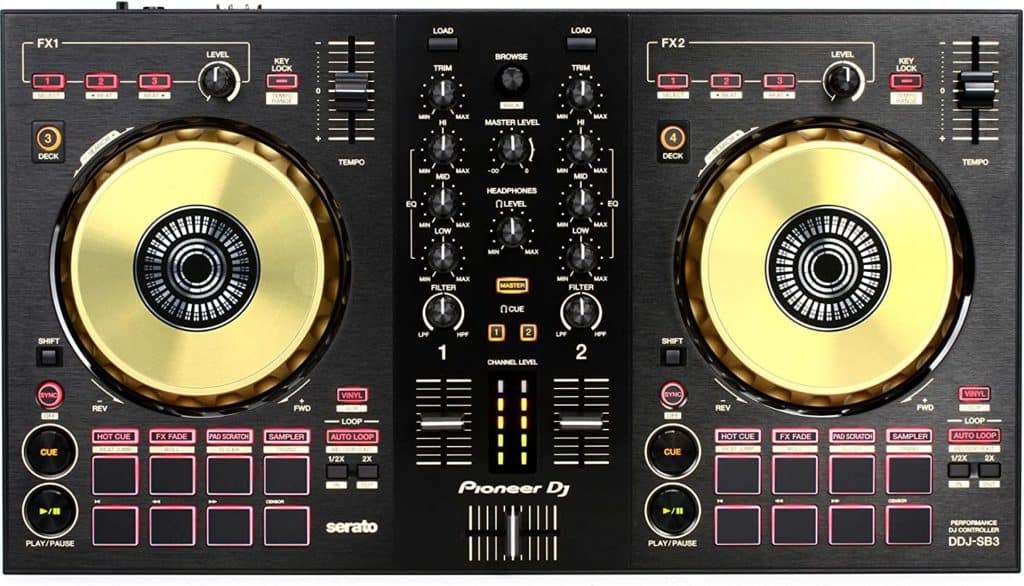
Alongside the scratch, patterns are a variety of auto fade-outs and the like which can be used to remove a track from your mix at the top of one of the hot-cue buttons (as long as you have pressed the appropriate selector button above them. There are a variety of sounds you can get here from automated highpass or low-pass fade-outs to chopping down the length of a loop from 16 bars down to half a bar for that EDM build-up effect. You can do all this by hand obviously, and could argue you are better off learning to do it yourself in the first place, but again, this is a controller to learn on and it allows you to do that very well.
In terms of software, the SB3 comes bundled with Serato DJ Lite – the controller can be remapped for other software but at its core, it’s Team Serato. This doesn’t get you all the benefits of what you can do on the machine, you will need to upgrade to Serato DJ Pro for an extra expense if you want to get into more advanced filters and looping and the like, but there is a monthly plan for that (like there is for everything these days) if you find you have outgrown the free software that comes with it.
By the way, the model you see here with the gold finish is a limited edition with a little extra stand-out bling.
- Great jog wheels
- Built in Roland drum machine
- Free 3 month sub to BPM Supreme record pool
- MIDI in to sync external synth
- Drum patterns awkward to program as hidden deep in OS
Our first look at a controller is the first that doesn’t come from industry DJ leaders Pioneer but arrives from instrument giant Roland. First things first, Pioneer has the advantage of being the main find in any club you might end up playing in. You are unlikely to turn up and find any Roland DJ equipment, well anywhere, but if you have slightly more eclectic ideas and are interested with the ancient are of music production as well, then Roland has gone all out to provide a feature that you won’t find on any other DJ controller in the shape of a built-drum machine packed full of its iconic 808 and 909 sounds.
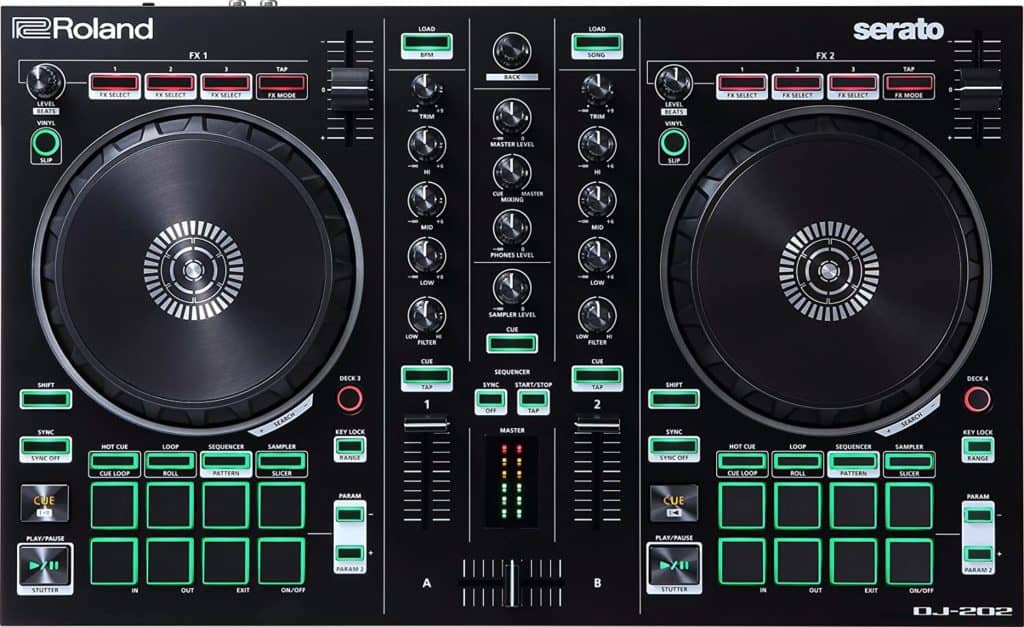
Sounds great, and it truly is, but I first saw this on the more expensive 505 and 707 iterations of Roland’s DJ line, and on the bigger models it is much more accessible, and therefore usable than it is on the 202 unfortunately where it is buried under a series of Shift clicks on buttons and simply not as intuitive, especially if you have programmed drum machines before.
This is a shame as it is a great feature that won’t get used anywhere near as much as it should be, but corners were always going to be cut due to price and size restraints here. You can still use it and use it well but the chance you will risk using it live in a party situation are reduced by the complexity added by the menus and the need for a photographic memory of the manual.
The DJ uses Serato so again the upgrade path to Serato DJ Pro is there if you outgrow the more limited features of DJ Lite. You also get a three-month subscription to digital DJ pool BPM Supreme which should get you on your way if you are lacking in music to play when you first start out you can sign up and download a nice starter to your library. Nice touch from Roland.
Other than that, worth mentioning are the jog wheels which are up there with the standard set by Pioneer so another plus point. If you aren’t bothered about the slightly non-standard club layout and have even a passing interest in creating your own beats alongside your regular set then the DJ-202 becomes a really interesting proposition. It’s just that you might be worth saving up a bit longer to get the 505 instead where the controls are separated out and are much easier to use.
Oh, one other thing of note is that the 202 has a MIDI port as well-meaning you can plug in an actual hardware synth and sync it all up via Serato and that could be very cool indeed if that’s your particular bag of tricks.
- Traktor software is rock solid if unspectacular in comparison
- Great build quality
- Lots of models of the Kontrol but the S2 hits the sport
- Traktor is not what you will generally find later in your blossoming career
When I initially made the transition from my trusty Technics 1210s to digital DJing it was an early version of the Kontrol s2 that I picked as my weapon of choice, and fun fact, I only recently sold it on to a good home. We are on Mk 3 of the hardware now and it’s fair to say it’s come a long way with better buttons and jog wheels than I ever had at my disposal back in the day.
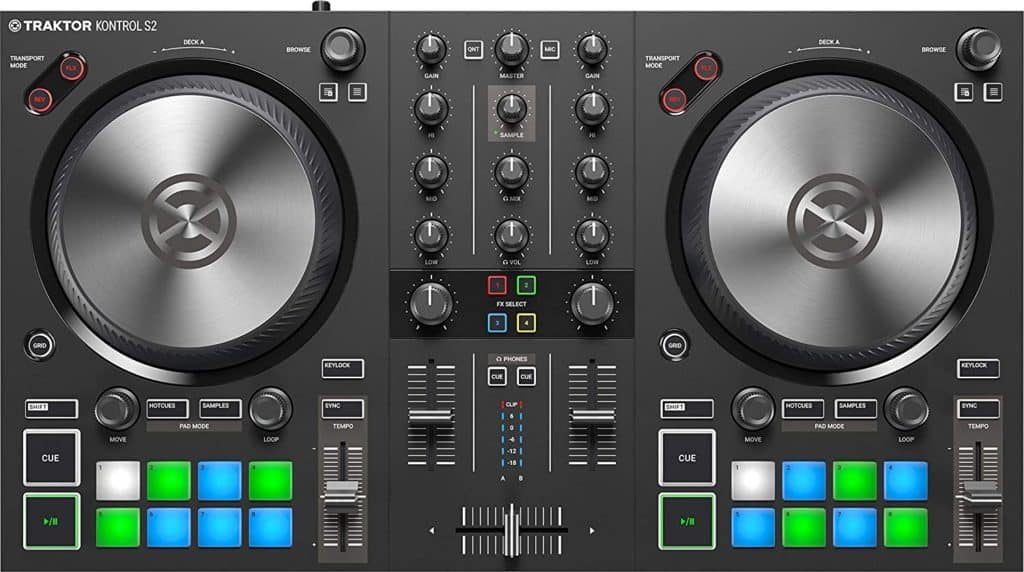
So with that in mind, I learned all my digital DJing skills with Traktor rather than Serato like I use now, and I still myself missing certain features of Traktor, even though it perhaps isn’t as flamboyant as Serato or even Rekordbox. The lack of partnership with DJ streaming services such as Beatport Link is constantly bemoaned by users and it seems strange that Native Instruments DJ team has chosen to leave this area alone.
The Kontrol S2 is a great controller though, but maybe any of the three above are better options unless you can find it cheap. Development and ideas seem to be a little be fresher and while you can still have a great party with the S2, yu may always be feeling you may have compromised a little bit too much in the end.
- The built-in risers are a fantastic touch
- Solid jogwheels far better than expected
- Less known of all the brands here
- Faders have a real short travel and beat-matching is trickier than it needs to be
It’s quite possible that even as a new, prospective DJ that you might turn up a snobbish nose at a controller from Hercules, simply because you may not have heard of them. Pioneer, Roland, and Native Instruments are all household names in the DJ arena, but what is a Hercules controller? Well, it’s a solid alternative that’s what it is, with a couple of standout features that some of the bigger boys would do well to copy.
When we are talking about features I perhaps shouldn’t be as enthusiastic about the addition of plastic feet as I am, but the legs that fold down, sort of like those on a keyboard elevate the missing platform to just the right height off your desk and bring it more in line with the height you might find in a club. It also provides a handy crawl space to tuck away and extra wires, and it projects a nice little LED lighting onto your DJ space as well.
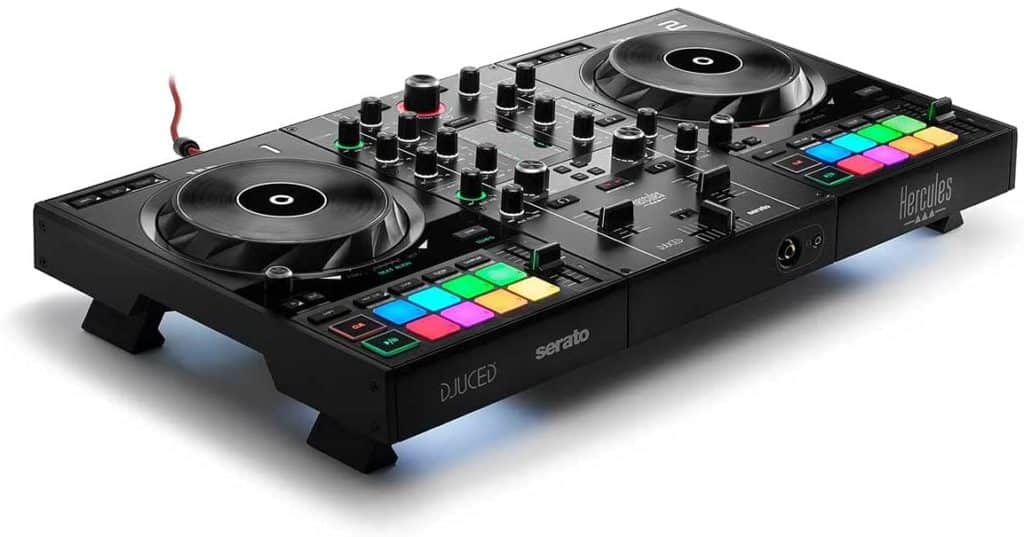
Okay, this is all largely aesthetic stuff but the actual hardware is also pretty good., The jogs are fantastic, and while all plastic the build never feels cheap at all. Another nice touch is the performance pads are all individually lit RGB which is something you would generally only expect on mid-range units and above.
You can use the Hercules with Serato and I’d suggest you do. Hercules have their own software called DJuced (don’t give me puns in this day and age) and while perfectly usable you arent going to see it anywhere outside of a Hercules controller, which for me makes learning it massively pointless.
There’s a lot to like about the Impulse 500 from Hercules and it’s exciting to see what they release next.
Best DJ Controller
What we have on this page are the low-cost options but if you have the budget you can obviously spend much more. Learning on more expensive equipment is easier because fewer corners are cut to get the price down. But if you can learn on equipment with compromises then progressing onto bigger, more pro gear is simplicity itself.
The thing to consider is how much use you will get out of it. We are willing to wager that an awful lof of DJ controllers is bought on a whim and rarely see the light of day after a few months, so is it better to make sure it is for you at a lower cost and then trade upwards to something with a few more bells and whistles on it if you decide it is for you.
What is the best DJ controller for a beginner?
Anything on this page will do you just fine. These five DJ controllers are, without a doubt, the best on the market and all at a remarkable price. It all depends on what you want to spend. You can learn to DJ on any controller whether it costs $200 or $2000. How deep are your pockets?
We’d suggest a Pioneer unit if you are serious as your progression to real-world gigs will likely see you end up on that brand of gear anyway so at least you will have a level of familiarity.
What is the best DJ controller for Rekordbox?
If we are talking for somebody just starting out then Pioneer’s DDJ-400 will sort you right out. It’s Rekordbox compatible right from the off and is the closest controller here resembling what you will find actual clubs. It’s a great controller, and you should buy it.
Our Verdict
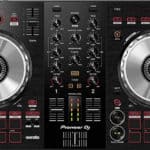
Best DJ Controller for Beginners
Yeah, I’m going for the DDJ-400 from Pioneer DJ, even though I’m not a big Rekordbox user and prefer Serato for the day-to-day quality of life stuff that has been built in over the years. Rekordbox is here to stay though and the DDJ-400 is the perfect tool with which to learn to use it on. Pioneer DJ are certainly boxing clever by providing a learning path from its beginner controllers all the way up to club and festival gear. It almost makes it a unique selling point you shouldn’t ignore. It isn’t that big a leap up from the also excellent SB-3 however, although neither of which can offer anything as unique as a built-in Roland drum machine like the DJ-202. Let us know which you pick in the comments below.


